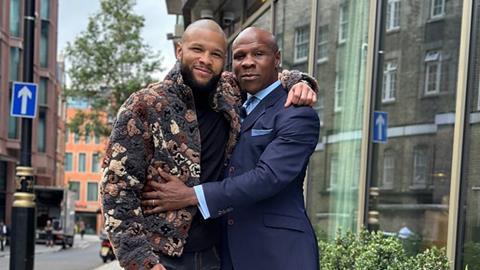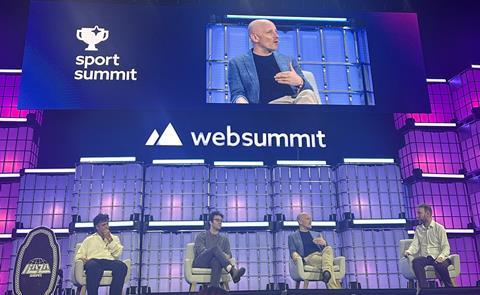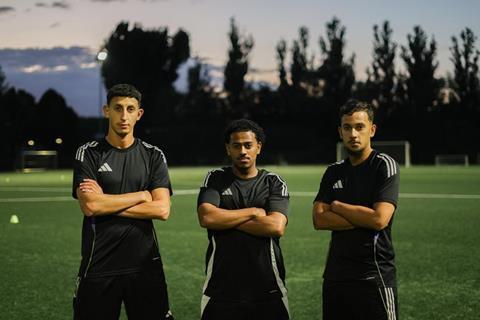The Eubanks producer Rick Murray on ‘trying to crack’ how TV, streaming, YouTube and social ‘intersect’

Four Kings and The Eubanks: Like Father, Like Son producer Rick Murray has admitted that TV-focused production companies have to “sit up and listen” as sport talent moves into creating their own content and “tapping into” audiences directly.
Murray, who heads up UK-based factual outfit Workerbee and is sports advisor at parent company Banijay, was speaking at Websummit in Lisbon and said he is focused on how the company “transitions from traditional TV” as viewing shifts to YouTube and shorter form content on social.
Workerbee has been behind a raft of sports docs, ranging from Prime Video’s boxing doc Four Kings, which won Sports Documentary of the Year (Series) at the Broadcast Sport Awards yesterday (13 November), and The Eubanks for BBC3, to Prime Video’s England’s Lions: The New Generation and Bruno v Tyson for Sky.
Speaking alongside Murray was Xavier Green, co-founder and chief technology officer at sports media rights firm ScorePlay, who said new tech is enabling athletes to effectively run their own production firms.

Green pointed to partnerships with “one-man teams” who work with athletes to “produce content for an audience worldwide, across many different languages, geographies, and across very different types of content.”
“We want to empower them with the technology,” added Green, who works with more than 250 sports organisations around the world to manage and monetise their media assets.
“Ten years ago, if you wanted your voice to go out, you needed broadcast equipment, you needed people to manage that. You needed the actual physical hardware. Now we’re trying to break through those barriers and basically turn any athlete or organisation into their own production company.
“We do that through technology that we use like AI to simplify the production [process] and remove the very operational aspects of production, so you’re just focused on the creativity and the message you want to get out there.”
Murray said part of his focus is on creating shows that “go beyond the performance” to explore the “human story” behind sport stars, adding that there are similarities in how his prodco and creators produce shows.
“We’ve really got to sit up and listen to the fact that athletes are making their own content now, and [they are] are tapping into audiences directly. So we, as old fashioned TV production companies, need to work out how do we get involved in that?
“As we venture into working with digital disruptors… it’s funny how many synergies there actually are in terms of what we do and what they do. And I think we can work together more going forward.”
The Workerbee boss pointed to the launch of FC Failliet/Finesse (FCF), a football club backed by Banijay Benelux that is made up of influencers and digital creators who will play in the Dutch professional football league. Daily updates on TikTok and Instagram, are planned, alongside weekly vlogs on YouTube, with fans able to follow matches and training sessions.

Adrien Raza, a European skimboarder and creator, said his short-form videos – many only 10 seconds long – had reached around 3 billion organic views last year and were supplemented with longer form shows of around 20 minutes on YouTube.
“I use short-form just for mass distribution of content, and then long-form is the whole story,” he said. Murray added that combining Raza’s approach and Workerbee’s strategy for shows in the more traditional TV/streaming mould – feature-length or multi-part series – provided opportunities.
“It’s about trying to crack how these two things intersect. YouTube has grown separately to the TV industry – it’s come along and it’s kind of taking bites out of the TV audience now. People would rather watch a lot of this content than they would sit down and watch six half hours or 90 minutes.
“So we’ve got to pivot and work out how can we please the audience coming for this more snacking, direct content, and what can we do as pretty big companies to facilitate that work with these guys.”
He added: “Getting young viewers to sit back on their sofa and watch things on a big TV is basically the business that we’re in. But I think in working together, we can make sure everything crosses over. And it’s great to hear and talk about authenticity…the rules of the game here are the same.
“No matter what you do, it’s authentic storytelling. It’s connecting with people. It’s universal stories, it’s emotion, and that’s what sport gives us, and that’s why sport is always going to be an amazing machine to create content.”








No comments yet